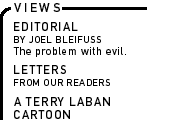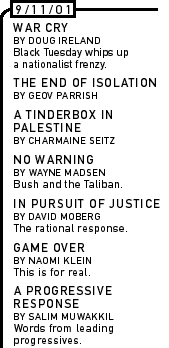|
|

|

|

|
|
|
| |
|
|
|
In These Times contacted leading progressives to ask them how the left should respond to the attacks on the World Trade Center and the Pentagon. Everyone we spoke with unequivocally denounced terror tactics against civilians and joined in the national mourning at the loss of so many innocent lives. They also unanimously urged citizens to draw clear distinctions between radical political actions on the one hand and terrorist action against civilians on the other. Their responses follow. Manning Marable
It's a horrific tragedy. The left has to forcefully and unconditionally condemn the use of terror as a political tool in any way or capacity, whether exercised by individuals or governments. But it looks like the Bush administration has drawn the wrong lesson, and unfortunately the political impact of the terror attack may push the national agenda sharply to the right. The Bush administration thinks solely in terms of retaliation, but we must break with the old way of thinking and strongly voice the view of Malcolm X, who said anger blinds human vision. Peace with justice is the only way to escape the dialectics of terror, and the United States must consider ways to back away from that dialectic. The left has to show the way. Manning Marable,
I am first chilled by the magnitude of this damage. My mind reviews my Rolodex, calling up the names and faces of friends who work in lower Manhattan. My heart stops when I think of them and their families. My second reaction is a stunned outrage. Whatever happened to U.S. intelligence? We spend billions of dollars annually spying and interfering in the operations of other countries. How could we have known nothing about this? Bush has said we need more money for the military. This attack will make the appropriation of more money a cakewalk. As outraged as I am, I am also reconciled to the fact that this attack, despicable as it is, was also provoked. The message of the United States has been "our way or the highway," and it seems that such a message begs someone to humble us. We cannot condone the hijacking of airplanes, the bombing of buildings and the loss of innocent life. But we must acknowledge that our nation's own hubris may have pushed others into testing our power and exposing our vulnerabilities. Julianne Malveaux,
The dangers presented by the September 11 terrorist acts do not restrict themselves to the external threat. We hear on television and radio calls for changing the laws and regulations in order to make it easier to conduct surveillance and to carry out covert operations against potential opponents of the United States. Rather than accomplishing anything in terms of reducing the threat of terrorism, such steps will eliminate basic civil liberties and strengthen the existing tendency toward a racist and classist police state. The police are already out of control and on the rampage in communities across the country. We cannot afford to further unleash their undemocratic and frequently murderous behavior in the name of national security. We should add that the terrorist attacks have also brought potential damage to the growing anti-capitalist globalization movement. The ruling class has been making noise for months about the demonstrations that accompany the gatherings of capitalist globalizers. They have inferred that these demonstrations will get increasingly out of control. There is no question that the events of September 11 will be used as a pretext to both discourage activity, as well as to clamp down on any and all popular outrage with neoliberal globalization. Black Radical Congress
The real lesson to be learned is that Americans must come to understand the root cause of the extreme reaction of people who are willing to give up their lives in suicide missions. Whether I condemn that activity or not is beside the point. By and large, the American public doesn't understand the depth of this crisis. Policy and evenhanded information have been held hostage. It's difficult for the United States to be an honest broker with such lopsided, pro-Israel policies. U.S. citizens have to understand that we can't be a global player and be immunized to the consequences of our global activities; citizens must understand the implications of the foreign policy of the United States and get more involved. Unfortunately, that will be more difficult in the coming days and months in the wake of this terrible terrorist act. Ron Daniels,
What makes me really nervous is the warlike rhetoric coming out of our leaders in Washington. It's as if we've never learned the obvious lesson that violence and retaliation merely deepen the cycle of violence and retaliation. We can look at other nations and see quite clearly that more killing seldom works. Instead of allocating billions of dollars for a war footing, we should take this time for critical self-reflection and try to figure out what has worked in other countries. Time should be taken for critical self-reflection to question the role of our nation in the international community. Cindy Levitt,
The administration says it stands for freedom, yet seems poised to restrict our liberties; it says it wants to limit terrorism, yet the terror-plagued Israelis seem to be its perverse model; it condemns the tactics of the terrorists, but indicates that it will step up its own use of violence; it claims the U.S. is a global peacemaker while our government has brutally bombed four countries in the past two years--we bombed Iraq just last week. We're supposed to be upset with a few Palestinians cheering this crime, while we partied as we bombed Baghdad; finally, we're supposed to pretend that the attacks this week were unprecedented when the only thing unique about them is that someone else has stooped to our government's level of brutality and savagery. Sam Husseini,
Let us seek an end to the militarism that has characterized this nation for decades. Let us seek a world in which security is gained through disarmament, international cooperation and social justice, not through escalation and retaliation. We condemn without reservation attacks such as these, which strike at thousands of civilians. May these profound tragedies remind us of the impact U.S. policies have had on other civilians in other lands. We also condemn reflexive hostility against people of Arab descent living in this country and urge that Americans recall the part of our heritage that opposes bigotry in all forms. We are one world. We shall live in a state of fear and terror or we shall move toward a future in which we seek peaceful alternatives to violence, and a more just distribution of the world's resources. As we mourn the many lives lost, our hearts call out for reconciliation, not revenge. War Resisters League
That this was a horrendous crime is not in doubt. The primary victims, as usual, were working people: janitors, secretaries, firemen, etc. It is likely to prove to be a crushing blow to Palestinians and other poor and oppressed people. It also is likely to lead to harsh security controls, with many possible ramifications for undermining civil liberties and internal freedom. The events reveal, dramatically, the foolishness of the project of "missile defense." As has been obvious all along, and pointed out repeatedly by strategic analysts, if anyone wants to cause immense damage in the United States, including weapons of mass destruction, they are highly unlikely to launch a missile attack, thus guaranteeing their immediate destruction. There are innumerable easier ways that are basically unstoppable. But today's events will, very likely, be exploited to increase the pressure to develop these systems and put them into place. "Defense" is a thin cover for militarization of space, and with good PR, even the flimsiest arguments will carry some weight among a frightened public. In short, the crime is a gift to the hard jingoist right, those who hope to use force to control their domains. That is even putting aside the likely U.S. actions and what they will trigger--possibly more attacks like this one, or worse. The prospects ahead are even more ominous than they appeared to be before the latest atrocities. As to how to react, we have a choice. We can express justified horror; we can seek to understand what may have led to the crimes, which means making an effort to enter the minds of the likely perpetrators. If we choose the latter course, we can do no better, I think, than to listen to the words of Robert Fisk, whose direct knowledge and insight into the affairs of the region is unmatched after many years of distinguished reporting. Describing "the wickedness and awesome cruelty of a doomed people," he writes that "this is not really the war of democracy versus terror that the world will be asked to believe in the coming days. It is also about U.S. missiles smashing into Palestinian homes, and U.S. helicopters firing missiles into a Lebanese ambulance in 1996, and American shells crashing into a village called Qana and about a Lebanese militia--paid and uniformed by America's Israeli ally--hacking and raping and murdering their way through refugee camps." And much more. Again, we have a choice: We may try to understand, or refuse to do so, contributing to the likelihood that much worse lies ahead. Noam Chomsky
|





